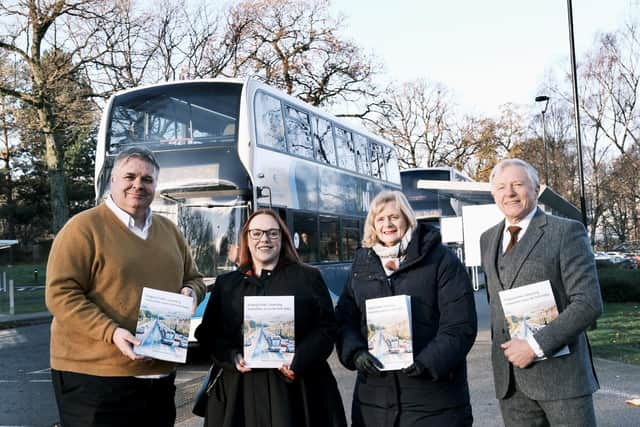Forth Valley Connectivity Commission: Call for local authorities to work together to improve transport links and economy
and live on Freeview channel 276
In Bridging Divides, Connecting Communities, the final report from the Forth Valley Connectivity Commission, it states that three major changes will drive quick wins for the region and change its path for the better.
These are: changes in how planning decisions are made; redeveloping and reenergising urban centres to become attractive places to live, work and socialise; and enhanced walking and cycling routes and public transport networks.
Advertisement
Hide AdAdvertisement
Hide AdA flagship proposal in the report is the creation of ForthNet, a regional Bus Rapid Transit network, which would provide frequent, reliable connections between communities in Clackmannanshire, Falkirk, and Stirling, and major places of work, education, and public services.


The report pulls no punches in its description of the current state of the Forth Valley which – like many other areas – has built up environments that are “outdated, car-dominated [with] declining retail”.
It urges key stakeholders in the region to challenge the status quo and change current practices if Forth Valley is to catch up with similar regions in Europe.
The report also calls for greater collaboration between the region’s three authorities, if region is to capitalise on major inward investments such as the Falkirk Growth Deal and Stirling and Clackmannanshire City Region Deal. Only once competition between the region’s centres is set aside, and economic challenges considered from a regional perspective, can meaningful changes be made that benefit the entire Forth Valley and all its communities, according to the Commission.
Advertisement
Hide AdAdvertisement
Hide AdBob Duff, chair of the Forth Valley Connectivity Commission, said: “Forth Valley is at a crossroads. Landmark investment is catalysing the region’s journey from one dominated by traditional industry to new, low-carbon ways of working. Our mission was to consider what changes to connectivity are necessary to ensure that this transition leaves no one behind and that new opportunities are accessible for all.
“The Forth Valley Connectivity Commission’s recommendations are bold but they represent the scale of thinking needed for Forth Valley to maintain pace with similar regions elsewhere in the world. If Forth Valley is going to seize this exciting opportunity for its people, then the time to act is now.”
The Commission’s final report was presented to the region’s three local authority leaders at a launch event at the University of Stirling Transport Hub earlier this week.
Councillor Cecil Meiklejohn, leader of Falkirk Council, said: “This is an extensive piece of work and we offer our sincere thanks to the Commission for their efforts in producing a comprehensive look at how potential changes could shape the future of the Forth Valley area.
Advertisement
Hide AdAdvertisement
Hide Ad“Moving forward, we will look at the report in detail and ensure it is given a proper examination to ensure the best for our communities.”
The independent Commission, founded in September 2021, brought together representatives of the local economy, local authorities, and academic expertise from the University of Stirling. The Commission’s secretariat was provided by the University of Stirling as part of Scotland’s International Environment Centre, which aims to develop the Forth Valley as a global exemplar of a net zero regional economy.
Read the full report here